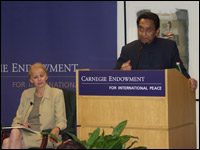Registration
You will receive an email confirming your registration.
IMGXYZ725IMGZYXDuring a June 28 discussion hosted at Carnegie, India's Minister of Commerce & Industry Kamal Nath addressed the development issues at the core of the Doha Round and the latest events in the negotiations. He presented India's perspective on the agricultural, non-agricultural (NAMA) and services negotiations. Carnegie's Sandra Polaski, director of the Trade, Equity and Development Program, moderated the discussion. Please find a summary of the event below.
On June 29 the Carnegie Endowment for International Peace hosted Indian Minister of Commerce and Industry Kamal Nath for a discussion of the development issues at the core of the Doha Round of global trade negotiations. The discussion took place against the backdrop of the recent collapse of negotiations between the G4—India, the US, EU and Brazil—to try to reach the outlines of a deal. Minister Nath stressed that no country is more committed than India to extending and strengthening the multilateral rules-based system of international trade. Yet a number of trends have fundamentally changed the global environment for negotiations and made reaching a multilateral agreement more challenging than in earlier rounds of trade talks. The greater economic weight of the developing world has reshaped negotiating dynamics, with countries such as India and Brazil assuming far more assertive roles. Even the poorest countries in the world show unprecedented engagement in the negotiations, spurred by improved access to data and technical knowledge. More information is now available to all parties on the impacts on different countries of a potential trade agreement and on the details of the negotiations themselves.
Minister Nath said these new dynamics reflect a fundamental reality that the Doha Round must embrace if it is to succeed: increasing world trade requires economic growth in the developing world. Minister Nath argued that Indian imports from the United States are currently increasing by 35% each year, not because India is lowering tariffs, but because India has a strong and growing economy. In fact, eliminating all tariffs, particularly on goods produced by India’s 650 million subsistence farmers, could actually reduce Indian demand for imports by dislocating these workers and dampening growth. This underscores the point that reaching a productive outcome to the round will require negotiators from all countries to respect sensitivities that circumscribe the flexibility of their counterparts.
Sandra Polaski, Director of Carnegie’s Trade, Equity and Development Project, opened the discussion session by asking Minister Nath to comment on how shorter term shifts in the political landscape may also affect the Doha Round, in addition to the secular changes identified by the Minister. Examples cited by Ms. Polaski include the expiration of President Bush’s fast track authority, upcoming elections in both the United States and India and new leadership at the World Bank by Robert Zoellick, the architect of US trade policy during much of the Bush presidency. Minister Nath responded that while these kinds of political developments can impact timetables, he generally views them as secondary to more structural trends that provide the real impetus for global trade liberalization. On the question of World Bank leadership, Minister Nath welcomed the arrival of Robert Zoellick, whom he had worked with to negotiate the 2004 Framework Agreement of the Doha Round.
In response to a question about the role of the developing country negotiating blocs in the collapse of talks the previous week, Minister Nath explained that India’s responsibilities as a leader of the G-20 bloc of countries did not constrain it in negotiations. Rather, representing the G-20 has guaranteed that India pursues a balanced deal because the G-20 itself groups together a broad range of offensive and defensive interests across different sectors. The positions taken by the G20 already represent a compromise between the interests of many developing countries.
In response to other questions Minister Nath stated that aid for trade would be necessary to realize the full potential of any Doha agreement; that revoking US trade preferences for jewelry exports from India under the GSP would harm the low-income jewelry workers in cottage industries that produce the products, though doing so was the prerogative of the US; that bilateral and regional trade agreements act more as building blocks than stumbling blocks for multilateral liberalization; and that negotiators in the failed meeting at Potsdam made some progress towards agreeing upon transparent and credible indicators to use in identifying “special products” among agricultural goods in developing countries that are important for livelihoods and food security.
